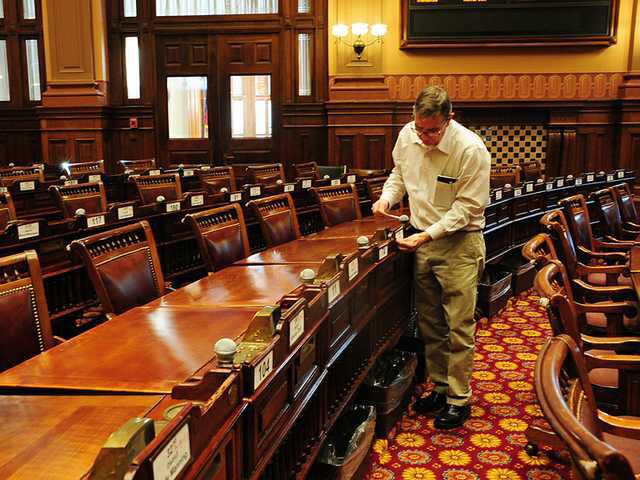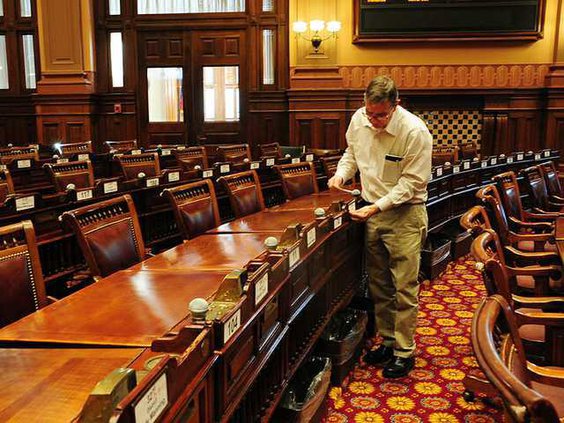Georgia's legislative leaders seem to have all eyes on making the environment conducive to growing jobs in Georgia.
"Government doesn't create jobs," Lt. Gov. Casey Cagle told The Times last week. "It creates the right circumstances and the right environment where jobs can be created."
Last year, the legislature started to work the soil by creating a funding mechanism, a proposed sales tax for transportation infrastructure, that promised to remove impediments to manufacturers' mobility.
They also laid the fiscal groundwork for projects that would supply water to budding industries.
And as the General Assembly reconvenes Monday, lawmakers are promising still more efforts aimed at creating a place where industries want to grow.
Gov. Nathan Deal plans to roll out a proposal for tax reform Tuesday that includes direction for legislators to eliminate a sales tax charged to manufacturers based on energy costs.
Other lawmakers are hinting at the possibility of lowering income taxes.
Neighboring states already offer tax credits on energy use, putting Georgia at a disadvantage in the competition for industries, said Rep. Carl Rogers, R-Gainesville.
The state portion of the energy sales tax is 4 percent, and it generates around $137 million in annual state revenue.
Sen. Butch Miller, who as a floor leader for Deal might be charged with carrying the proposal in the Senate, said the tax credit could give Georgia a leg up. At the very least, it would "put us in an even playing field with the states that do have it," the Flowery Branch Republican said.
The Republican rhetoric that lower taxes drive economic growth isn't new, nor will the energy tax credit be an isolated effort at backing the rhetoric up this year.
Legislators are also gearing up for tax reform, though it's not yet certain what shape the reforms will take, or if they'll take.
"What animal or what version that takes, I'm not sure," said Rep. Doug Collins, R-Gainesville. "I don't really think anybody knows ... there's a lot of iterations out there."
Tax reform is never an easy task, even with one party holding the reins. Last year, for example, it was a stated priority that didn't go anywhere.
And this year, changes to the tax structure are even more complicated as legislators look to a bid for re-election in November.
"Election years are always interesting years politically, and also with legislation," said Collins, a floor leader in the House.
There are indications that lawmakers might move away from a reliance on income taxes and step toward a revenue stream that is more heavily based on sales taxes.
But no one is making any promises.
Tinkering with the current tax structure could make it that much more difficult to balance a budget.
Miller estimates that a 1 percent reduction in income taxes would mean a $1.6 billion loss in state revenue.
"If you're going to reduce the state income tax, you're going to have to have some things to offset it," Miller said.
Already, the lieutenant governor has said he is against making up the difference by reinstating a state sales tax on groceries. Cagle credits the combination of sales and income taxes with hedging the state through tough economic times.
Meanwhile, Miller calls the move away from state income taxes "a long-term goal."
He, Rogers and House Speaker David Ralston said they favor the move, but none are sure legislators can accomplish the goal this year.
"Sometimes, it takes some time to make a change that's that fundamental and that big ..." Ralston said. "What's important is that we move the ball down the field, and that we continue to make our tax code competitive."
And as the governor and the flock of Republican legislators seek what they said are more business-friendly taxes without putting the burden on others, it will most definitely mean another year of cuts to state spending.
Gov. Nathan Deal, in an interview with the Associated Press, said he is seeking to completely eliminate some state agencies to make government ends meet.
Deal also told The Times he would support a plan to merge some state colleges to streamline costs.
He's told departments to make budget proposals about 2 percent smaller for the fiscal year that begins in July, according to the Associated Press.
Even though the first five months of the state's current fiscal year brought net revenue collections that were 6.8 percent above the same time frame a year ago, "We're still dealing in an economy in which we have limited income," Collins said.
Among Cagle's budgetary concerns are rising Medicaid costs and the ever-growing cost of state health care and unemployment costs.
"We are looking at almost a billion dollars that we're going to have to make some adjustments to," Cagle said, not including anticipated cuts in funding from the federal government.
Both Cagle and Ralston have promised to guide their respective chambers toward more budget cuts this year, though Ralston said he is "hopeful" the cuts won't need to be as severe as those in years' past.
"The reality is that state government will never be again what it may have once been," said the speaker. "We'll never be spending at the levels that we once did. We're in a new era, I think, of limitations on government spending at the state level."
And by trimming government revenue and spending, lawmakers hope Georgia's industry will find room to grow.
Kit Dunlap, president of the Greater Hall Chamber of Commerce, said Georgia is already a business-friendly state but risks complacency if lawmakers don't work on new adjustments.
"We've got the right people and the right attitude," Dunlap said. "Sometimes some good adjustments in this environment will make the difference."

